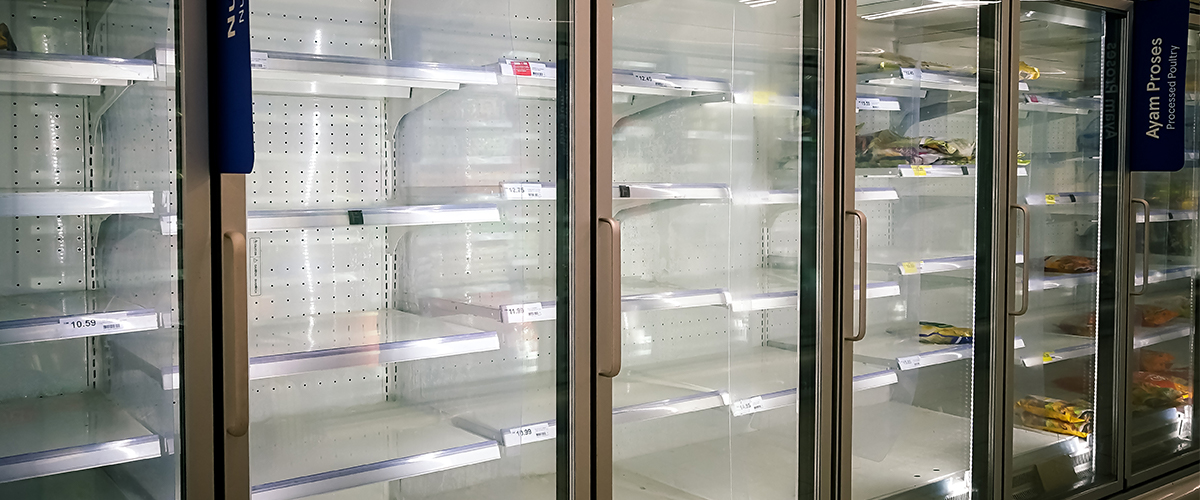A Business On The Move
To grow their businesses, small business owners have relied on efficient transportation. Rising online sales and prompt delivery of goods and the Covid pandemic have been propulsive agents behind this trend in the last few years as consumers prefer their goods delivered. A reliable workhorse is required for small emerging enterprises to anticipate these demands. The cargo van is still the best option to transport goods and equipment. However, the cargo van is much like individual automobile purchases; one size does not fit all. Instead, it depends on the particular industry in which the business is involved. You will need to screen and select the appropriate commercial vans according to your specific needs.
Cargo Van Carrying Capacity
The first thing to consider would be the carrying capacity of the cargo van. A cargo van’s capacity applies to the interior and the outside of the vehicle. Cargo vans are available in several sizes, but before deciding on the biggest possible option, you would also consider the tradeoffs of owning a large cargo van like fuel economy and handling.
Even if the plan is to expand in the future and extra space is required, opting for a van that satisfies your current requirements would be ideal. Optimally, it would be advisable to go with a cargo van that is not too large or small. On the other hand, it would not be too prudent to purchase a van that cannot handle large hauls, especially if the business deals with wholesale distribution.
Cargo Van Budget
Secondly, you’ll need to consider the budget. Regardless of the business, the financial elements of a large purchase are essential. Business owners ought to go for economically priced commercial vans that are equally easy to maintain. The latest models have several amenities, from technology to luxury trim, but going above the budget because of infotainment or electronically adjustable seating will not do you any favors. Save that money for the potential overheads that may follow the purchase.
Cargo Van Features
One of the best features that cargo vans offer is their load capacity due to their spacious interior. Cargo vans generally have a standing height of up to 76 inches and can accommodate 12 passengers. Newer vans also have modern features, like multifunctional steering wheels, leather trimming, and storage reserves. You should be able to haul many items conveniently and efficiently and deliver your products to market.
Most small businesses do not have an unlimited budget for shipping and transportation. So the means of transport should be oriented towards saving as much money as possible. Some commercial vans have high-capacity engines, while others are turbodiesel variants. The goal would be to obtain high fuel-economizing options considering these vehicles will be in transit for several hours per day. Conversely, small engines may not do the trick, as the van might be hauling heavy items back and forth over long distances. Ideally, a business should consider a van with sufficient torque to do its job but provide enough fuel economy to make business sense.
Cargo Van Safety And Design
Safety and design are essential attributes as well. Most modern vehicles come equipped with standard safety packages, but it does not hurt to do a little research on the safety record of your prospective purchase. Anti-lock brakes, rearview security, and traction control are some of the things that add to the safety and convenience of the package. They enhance the chances of accident avoidance and mitigation as current models increase the number of amenities provided.
Commercial vehicles do not have a higher accident rate than other vehicles in America; however, the crashes tend to be harder on other vehicles. For example, some van drivers are obnoxious, regularly break the speed limit, and are often inattentive. With more commercial vans on the roads, the risks of accidents involving these vehicles will increase statistically speaking.
The factors that play a role in commercial van safety would be the crash protection design of the van and its incorporated safety features. Vans tend to be taller and heavier than passenger cars, so body roll has a higher potential. Of course, improving vehicle safety compliance with these vans is a priority for the federal authorities. It would be advisable to go for vans with a proven safety record and features like advanced driver assistance systems, which they should include as long as your budget allows. When put to the test, ADAS systems are known to perform well and even potentially limit the chances of vehicular collisions. Small business owners would appreciate the peace of mind and confidence offered by these technologies.
Cargo Van Brands
The particular brand you choose is also an essential factor you’ll need to look at in your purchase. Certain cargo vans may offer excellent amenities such as high fuel efficiency or lots of power, but if these models are rare in the primary market, this could mean that it may be difficult to find parts, and this would inflate the cost of repair for even minor issues. Commercial vans run all day long and are susceptible to wear and tear like any other machine. It would be best to get a reliable but standard model where parts are readily available when something breaks down. That cuts down on overhead for your businesses.
Cargo Vans – Retaining Value
If you want to buy a new cargo van, there is a good chance you are considering its resale value. Certain commercial vehicles do not have high resale values meaning you would sell the vehicle at a significantly lower price when the time came to replace your fleet. Depreciation is expected in newer vehicles. In contrast, a used Ford may have a high resale value because of its reputation as the ideal option for small businesses. You should also consider whether your van will retain its value as well.
The factors to consider during the purchase are seemingly endless, but there are a few cargo van options to keep an eye on if you have a small business.
Ford Transit Connect Cargo Van
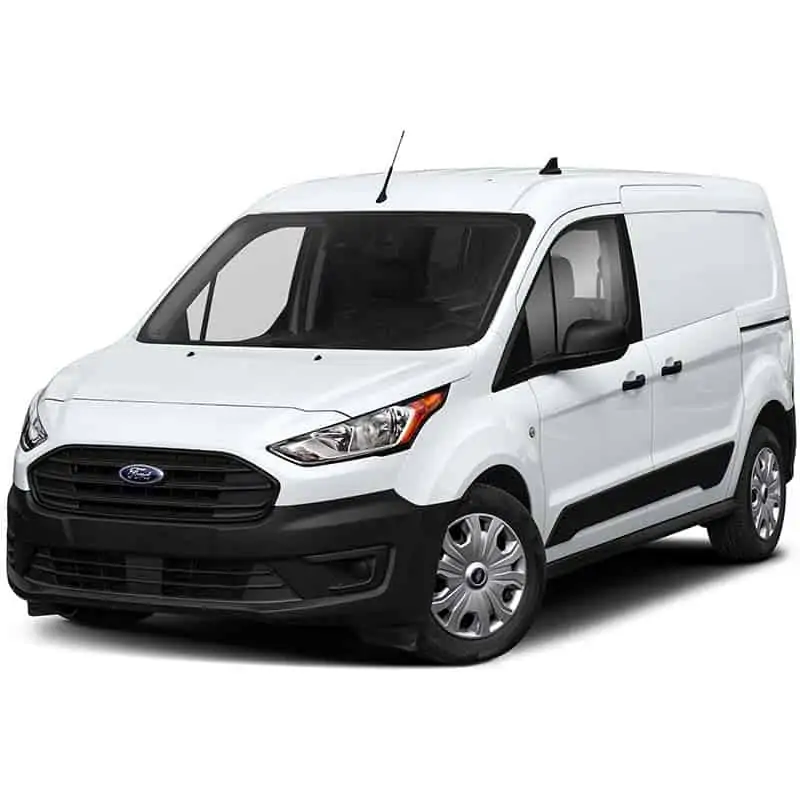
The Ford Transit Connect could be confused with the larger flagship model. Despite the small size, it can haul a surprising amount of cargo. The power comes from a 2.0-liter turbocharged four-cylinder engine that generates 162 horsepower, though Ford also offers a 2.5-liter alternative for fleet customers. When paired with an eight-speed automatic transmission, the Transit connect manages a surprising payload of 1570 pounds. It is impressive, considering the maximum cargo space is 145 cubic feet.
Thanks to accurate steering and low body roll levels, this van is very nimble around town. Ford rated the fuel economy at 25 miles to the gallon, sufficient for city runs, thanks to the turbocharged engine.
The Ford Connect has many connectivity packages. It adopts the same Wi-Fi hotspot package available in the Transit and Ford’s Sync infotainment. All of that is integrated with Apple Car-play and Android Auto. Every model comes with a low seating height that makes you feel like it’s a car instead of a truck or an SUV. The dashboard is user-friendly, and there are physical controls for climate control.
The Transit Connect is well adapted to city roads and is well suited to urban-based businesses. Though some of the driver assistance packages are standard, the rest are optional. Typical offerings for the Transit include forward collision, automatic emergency braking, lane departure warning, and blind-spot monitoring. The combination of agility, payload, and fuel economy also makes it well-suited for these short runs. Ford has also granted Connect a generous warranty standard for the industry. The rate for these attributes begins at $26,750. The rating is more than reasonable for small business owners who are starting out and might appreciate a smaller vehicle.
Dodge Grand Caravan – Mini Van
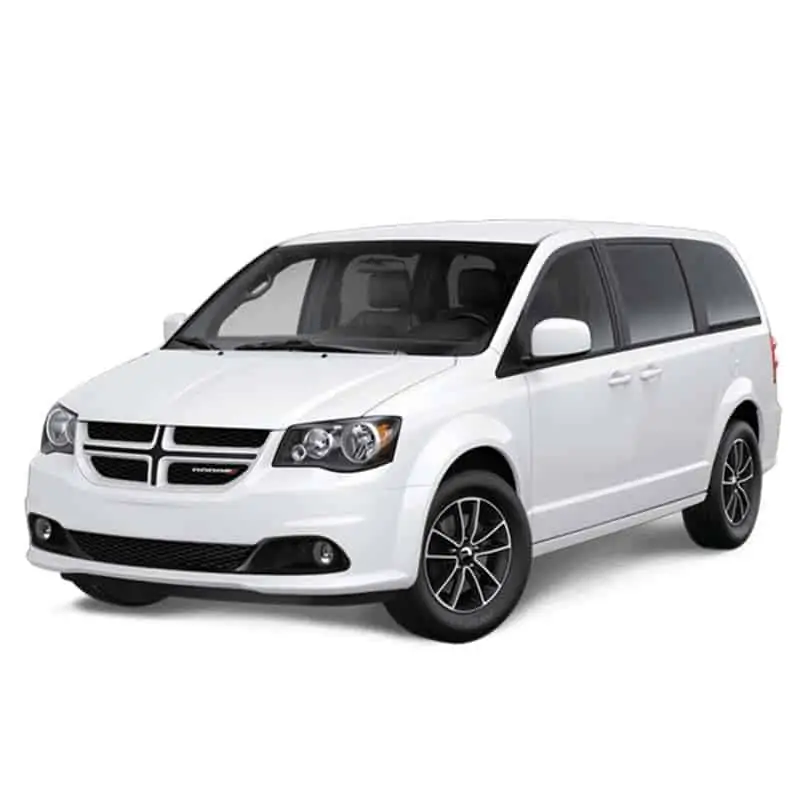
The Dodge Caravan has the most history of any minivan for sale; hence it has a rich heritage. It wore the same look since 2008 before it was repurposed as the Chrysler Voyager. Like the other utilitarian models, the automaker focused more on functionality.
When the fold-away rear seats are removed, the Grand Caravan has a cargo capacity of 140.3 cubic feet of storage. As it doubles as a passenger van, the grand caravan’s seven seats also provide a decent amount of space for each passenger. Dodge rated the payload capacity at 1800 pounds which is competitive considering the van also doubles for passenger ferrying. There are several additional hidden compartments and in-floor storage that offer extra space and security.
All of the Caravan models came with a 3.6-liter V6 engine paired with a six-speed automatic transmission. Business owners prefer this model due to its comfort and capable acceleration. They generate 283 horsepower, sufficient for hauling large items and provide for a smooth shifting transmission. The fuel economy is 22 miles to the gallon on average which is understandable considering the powertrain.
Even if the plan is not to transport passengers that often, you’ll still need the van to comply with safety codes. Dodge Grand Caravan is equipped with safety kits that counter its top-heavy design like electronic stability control and all-speed traction control. If there was an incident, the cabin is equipped with seven advanced airbags for the occupant’s safety. Dodge also installed crumple zones and constructed a steel safety frame that would transfer the kinetic energy around the cabin instead of through it. The Dodge Caravan is currently priced at $27,290. That being said, it does offer significant value for money and is an option to consider.
Mercedes-Benz Metris – Cargo Van
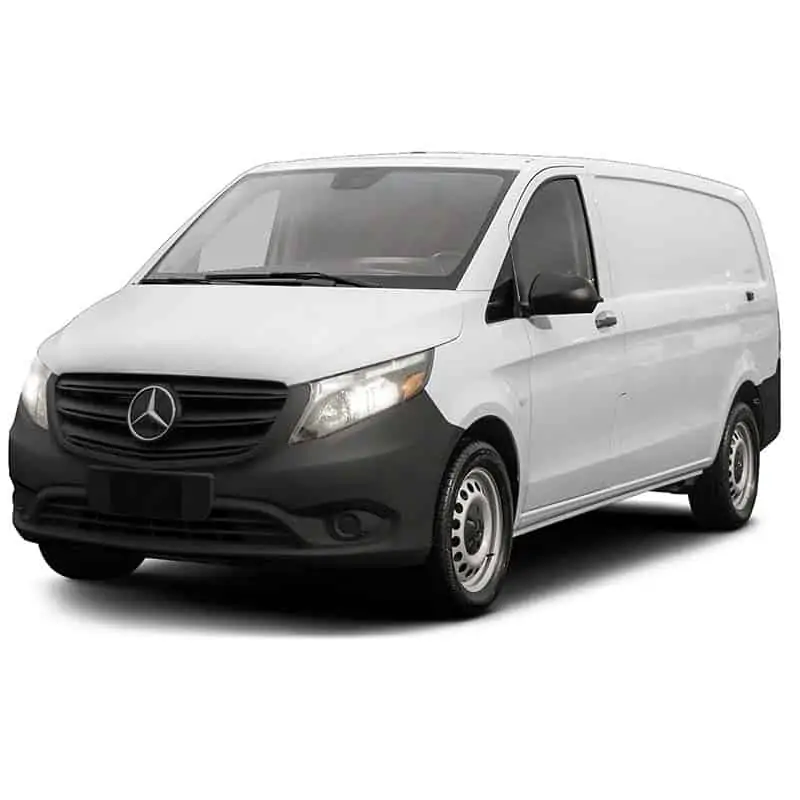
The Metris is one of the most versatile work vans because of its removable seating. However, the Metris is not just another cargo van. Business owners who have additional transportation requirements are easily impressed by this incredible design, blending the different objectives of the cargo and passenger van.
Apple Car Play, 7-inch touchscreens, and automated emergency braking are all part of the standard package. Its powertrain is also simple as all metric vans are equipped with one turbocharged four-cylinder engine producing 208 horsepower. The power is to the back wheels linked to a nine-speed automatic transmission. The acceleration should be reasonably good, but what’s most impressive is its capacity of 199 cubic feet, yet the payload is 5000 pounds. That is fairly higher than several of its competitors..
The cabin is not as plush as what we might find in typical Mercedes passenger models, but the design is pleasant. It also does an excellent job of keeping road noise out while driving.
Safety is a strong point, as the Metis has good driver assistance packages. Hill-start assist rearview cameras, blind-spot monitoring, lane-keeping assist, and active parking assist.
The Mercedes Metris represents all of the functionality needed for a commercial van with the addition of reputational appeal. Business owners may think that a Mercedes is too rich for their blood, but other choices can be less powerful and probably wouldn’t haul as much. There is also something about having workers deliver your goods in a Mercedes versus another brand that will improve brand image.
Chevrolet Express – Cargo Van
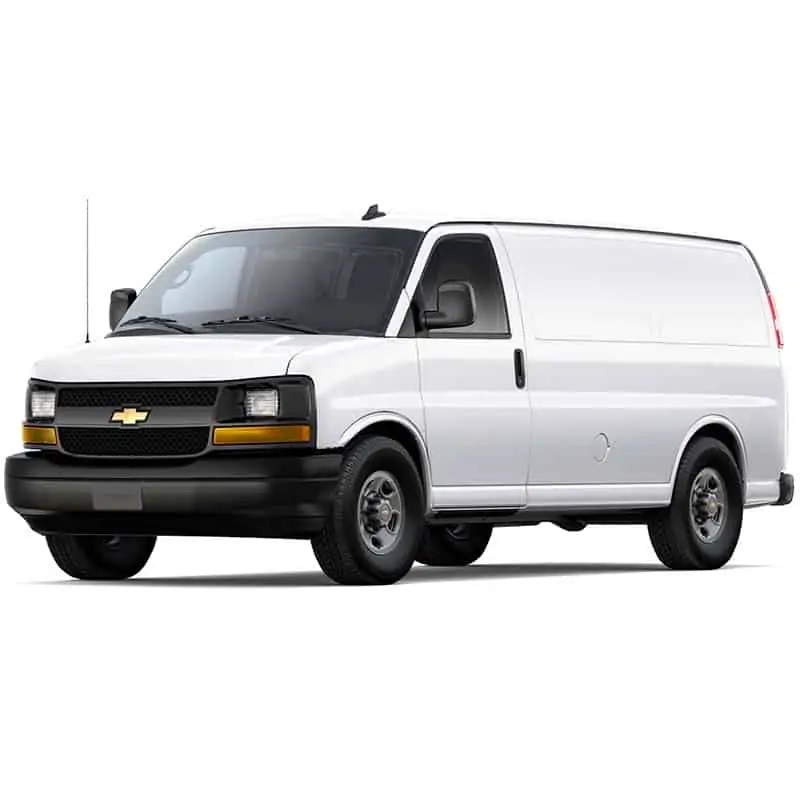
The Chevrolet Express is a full-size van known for its straightforward design, yet it is pretty versatile. True to its purpose, the Express provides significant interior capacity at 294 cubic feet. The cargo van is relatively basic because of its practical orientation.
Chevrolet Express technology has come a long way, with speed, fuel economy, and range. Bluetooth and FM radio are also available on the standard models.
Under the hood, you’ll choose between three engines to the rear wheels. The first two options are a 4.3-liter V-6 and a 2.8-liter four-cylinder turbodiesel capable of 276 and 181 horsepower. The highest trim level has a 6.0 liter V-8 churning 341 horsepower. Noticeably, the Chevrolet Express has larger engine capacities than its rivals though the standard 3500 models can hold up to 4503 pounds. However, the fuel economy is 13 to 18 miles to the gallon, which is not the greatest, depending on the engine choice.
Safety is also a priority for the Chevrolet Express despite seeming so scant. The automaker made sure to equip the van with tools to reduce the chances of an incident. Advanced safety systems like blind-spot monitoring, rear parking sensors, and forward collision alert can be optional or standard depending on the trim level. Every express variant has start assist and frontal and side airbags.
The Express’s warranty coverage is solid, which minimizes its maintenance costs. The limited warranty would cover three years, while the powertrain warranty covers five years. Every year of operation is equivalent to 12,000 miles of use. The Chevrolet starts at $34,000, which is on the higher side, though it is a proven option among commercial vans.
Dodge Ram Promaster – Cargo Van
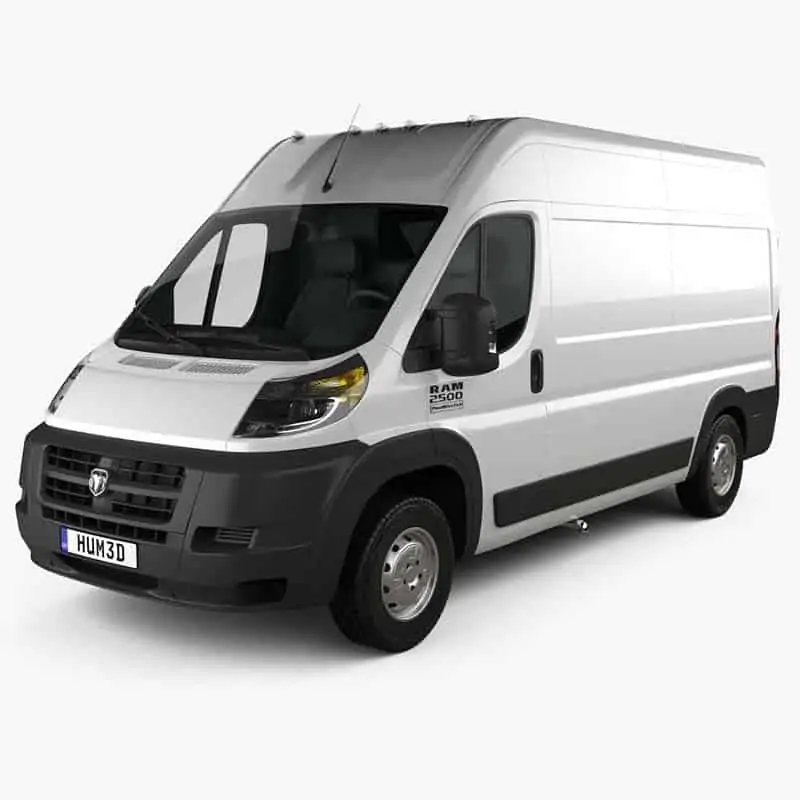
If you need large cargo capacity without much fuss, the Ram Promaster might be precisely what you’re looking for. It provides a great alternative to the popular Ford Transit and Sprinter. The Promaster is based on a front-wheel-drive system, which sets it apart from most rivals’ rear-wheel-drive designs. Being a front-wheel-drive brings a few advantages. The extra weight on the driven wheels gives the ProMaster better traction when the road is slippery. The van also has a tight turning circle for better maneuverability.
There are two engine choices for the Promaster, including a 3.6-liter V6 and a 3.0-liter turbodiesel. These produce 260 and 174 horsepower, respectively, which is relatively lower than several of its rivals. Fortunately, the payload capacity for the base model is 3,990 pounds, which is above average. Standard features aboard the Ram Promaster include 16-inch wheels, split-opening rear doors, remote locking and unlocking, and cloth upholstery. The 2500 and 3500 variants are available with the same equipment, but they have the advantage of heavy-duty suspensions for higher payloads. However, it is worth mentioning that the Ram Promaster returns 13 to 18 miles to the gallon, which is understandable because of the payload capacity.
As a business owner, the first thing you will notice with this commercial van is its quick acceleration. This model’s aesthetics are far from the bland designs on most work vans. Its comfort features are excellent with or without goods, and the low load height makes the back accessible. Starting prices begin at a very reasonable $29,995.
Nissan NV200- Cargo Van
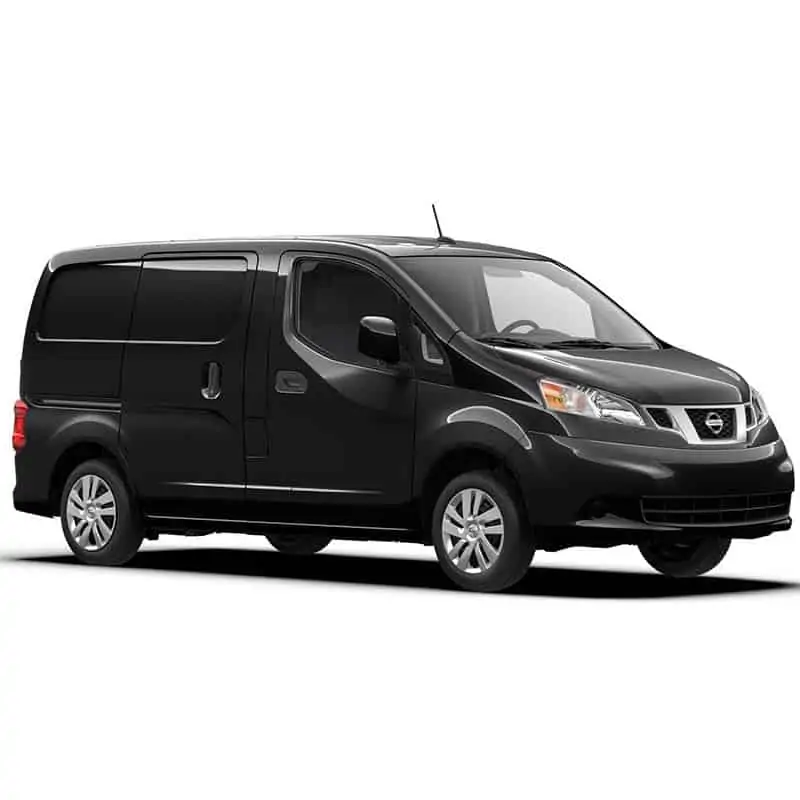
The NV200 highlights include economical pricing, fuel efficiency, and significant power. Appearance-wise the NV200 has a compact exterior though that is misleading as the cargo volume is impressive at 122.7 cubic feet. Its load capacity is also a strength due to the generous 3500-pound payload, one of the highest on the market.
The NV200 is also a two-seater with a few advanced technological attributes, including infotainment screens, steering wheel controls, and standard Bluetooth hands-free phone connectivity. Nissan then added combined cruise control and a speed limiter for convenience and safety. Every NV200 also has a gearshift indicator on the dash to assist drivers in minimizing the level of fuel consumption.
The van relies on a 1.5 dCi diesel engine generating 90 to 110 horsepower. The power is also sent to the front wheels through a five and six-speed manual gearbox. Nissan maintains the powertrain set up is capable of 57.7 miles to the gallon, which is expected from the diesel engine. That alone increases incentive as it translates to reduced fuel costs for entrepreneurs.
The automaker recently produced an eco-friendly full-electric version known as the Nissan e-NV200, which would be exceptional to a business owner considering the zero fuel charges. However, the range on this new model is a maximum of 187 miles so it would be optimal for short trips in the city.
The NV200 is not the fastest model, but its payload capacity and practicality make it a safe purchase. It is also quite economical as the service intervals stand every two years. The NV200 may not have the latest gadgets available, but it is ideal for small business owners on a budget. For these amenities and more, the NV200 is priced at $22,300.
Ford Transit Van – Cargo Van
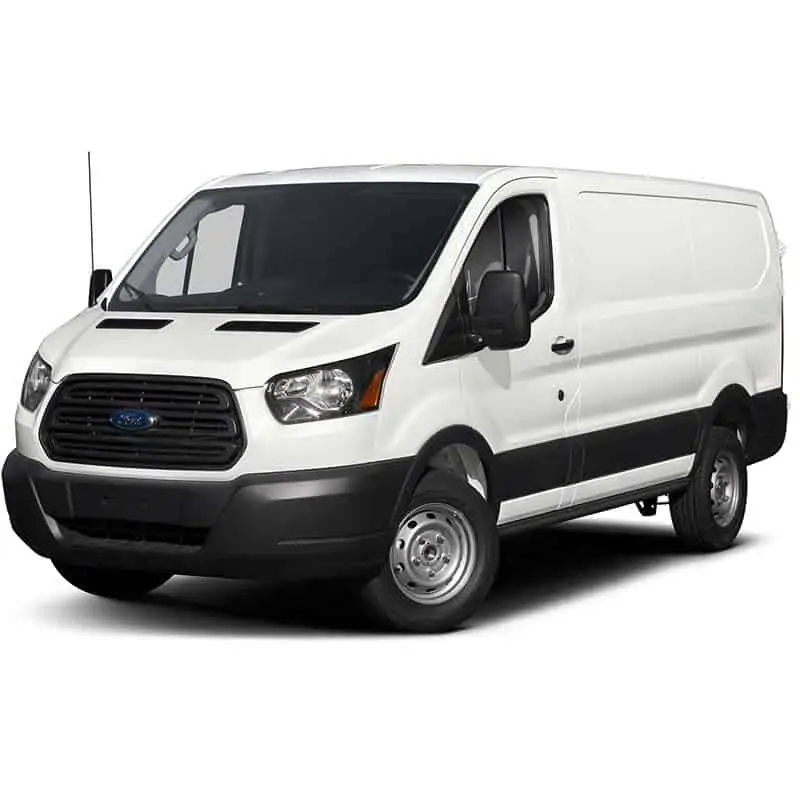
The Ford Transit van is the most popular commercial van in the United States due to its numerous features. This is probably because of its smooth handling and high cargo capacity. It may not match some advanced safety and connectivity attributes of its upscale rivals, but the Transit offers car-like technology.
The Transit comes with a 3.7 liter V6 that produces 275 horsepower for the American market. There was also an option for a 3.5-liter twin-turbo Eco-boost V6 producing 310 horsepower. Ford has made updates to the powertrain to improve these models’ fuel efficiency, resulting in a whopping 43.5 miles to the gallon. The motivation to reduce running costs in the Transit was not limited to the engine bay. These vans come equipped with high-mounted lights and all-around body protection to lower the potential for damage in case of accidents. Business owners would be glad to capitalize on the increased security of their vehicles, not to mention reduced running costs.
Ford also subjected the Transit to a battery of tests, 680,000 miles of driving within the full range of conditions. Of that range, half was in the hands of Transit customers who used the vehicle regularly. Ford recorded the problems, and they made adjustments to ensure the optimal level of reliability. Ford also set its load space uniformly so large items would be easy to get into the vehicle. The Transit excelled on the most prioritized fronts from practicality to performance and safety. It blends the modernity availed by amenities with a relatively cost-effective approach. The Ford Transit is currently priced at around $33,135, which is reasonable though business owners can seek more affordable options.
Mercedes-Benz Sprinter- Cargo Van
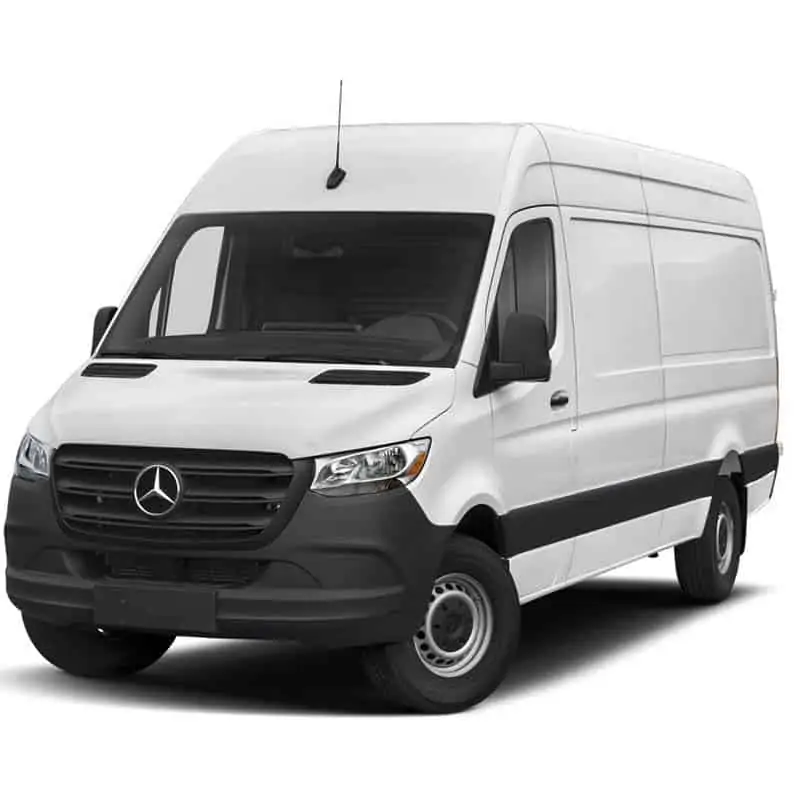
The Sprinter is a very popular option due to its brand pedigree and cargo capacity. It bares Mercedes elegance in styling, featuring slender headlights, blistered wheel arches, and an upright windscreen. The Sprinter also has several layout options, including four body lengths and three roof heights you’ll get to choose from. A chassis cab also allows you to add several conversions.
Mercedes equipped the Sprinter with a 2.1-liter four-cylinder engine capable of 82 to 129 horsepower depending on the output option chosen. There is also a 3.0 liter V6 turbo diesel rated at 187 hp for those who prefer that extra torque. With that under the hood, the Sprinter has a payload capacity of 3500 pounds as the cargo volume is 319 cubic feet. The Mercedes does have a higher capacity for goods and more power to tug them along, but the question is how it performs in the fuel efficiency department.
The 2.1-liter engines return 35 miles to the gallon, while the V6 gives you 14 mpg on average. The smaller engines are more practical for continuous runs but still expensive from industry standards.
The Mercedes is very advanced. With electric power steering and advanced safety systems. Distronic adaptive cruise control can bring the Sprinter to a stop before it drives off again, and it can cope with stop-start traffic without driver input. The Sprinter is priced at between $33,790 and $44,390, making it one of the more expensive commercial vans on the market.





